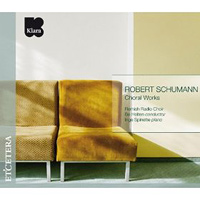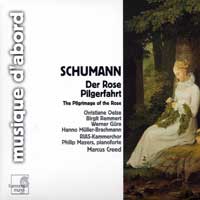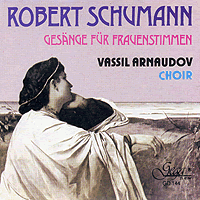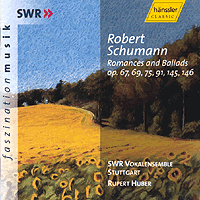In Celebration of the Human Voice - The Essential Musical Instrument
Home | Doo Wop | Barbershop | World | Contemporary | Christian | Vocal Jazz | Choral | Christmas | Instructional | Arrangements
Classical | Opera | Musicals | Personality | Young Singers | Disney | Videos | Songs | The Artists

Robert Schumann
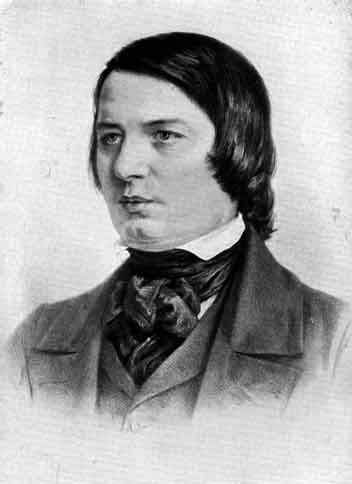
Born in Zwickau, Germany in 1810, Robert Schumann started his musical education on the piano. The son of a bookseller, he began to experiment with composition at an early age, and also cultivated a passion for poetry and literature. Although richly talented, he was never considered a prodigy, especially by the standards of the time. At sixteen, after the tragic deaths of his sister and father, he entered the University of Leipzig to study the law; but this didn't last long, and soon he had left the school to pursue music with all his energies. At the age of twenty, Schumann was studying the piano with Friedrich Wieck in Leipzig; he also boarded with the Wieck family. Although a hand injury prevented him from pursuing a career as a keyboard virtuoso, he found a niche writing music criticism - and composing, an activity, which was starting to focus his considerable talents. In the early 1830s, he published several piano pieces to critical acclaim. In 1834, he founded the New Journal for Music and served as its editor for the next nine years; the publication attacked what Schumann felt were the shallow and inconsequential musical practices of the day. On the positive side, he recognized the brilliance of Chopin and Brahms. |
Arrangements | Recordings
Recordings and DVDs
Displaying 1-4 of 4 items.
Flemish Radio Choir : Robert Schumann - Choral Works Overshadowed by his orchestral, chamber, keyboard, and vocal music, the choral works of Robert Schumann are seriously neglected and have become a specialized interest for devotees of the genre. Yet some of his most charming music was written for choir, and in the hands of a really capable group, the music is as appealing as any of Schumann's most popular songs or miniatures. The Flemish Radio Choir, a small ensemble under the direction of Bo Holten, is one such group, and its beautifully blended voices lend these choral songs a purity and sweetness that are wholly appropriate for Schumann's poignant harmonies and lyrical settings of German poetry. Most of these songs are performed a cappella, which creates a rather light and airy effect in the resonant studio acoustics, though the numbers with piano accompaniment, played by Inge Spinette, are grouped at the end of the program, so the change of sound isn't unsettling. Because there are few recordings of Schumann's choral works, and even fewer performed with such eloquence and polish, this disc may present the best opportunity to hear this overlooked repertoire. Songlist: An die Sterne, Ungewisses Licht, Zuversicht, Talismane, Der Konig von Thule, Schon-Rohtraut, Heidenroslein, Ungewitter, Der Traumende See, Die Minnesanger, Die Lotosblume, Am Bodensee, Gute Nacht, Tamburinschlagerin, Klosterfraulein, In der Nacht, Es ist verraten, Ich bin geliebt RIAS - Kammerchor : Schumann - Pilgrimage of the Rose Considered by W. Siegmund-Schultze as 'formally the most perfect of Schumann's choral compositions', The Pilgrimage of the Rose was composed in 1851, a few months after the composer had received a manuscript from the poet Moritz Horn with a subject he found fascinating. This fairy tale, deeply impregnated by the spirit of the Biedermeier period, tells the story of a little rose that aspires to the human condition - and thus, to love. In a few weeks Schumann composed this huge fresco for chorus, soloists and piano, orchestrating it in 1851-52 with the aim of reaching a larger audience. But it is undoubtedly in its original form that the work is most pertinent, because it is entirely in the glorious tradition of the Romantic Lied. Songlist: Die Fruhlingslufte bringen, Johannis war gekommen, Elfenreigen: Wir tanzen, wir tanzen, Und wie sie sangen, So sangen sie, Bin ein armes Waisenkind, Es war der Rose erster Schmerz!, Wie Blatter am Baum, Die letzte Scholl' hinunterrollt, Gebet: Dank, Herr, dir dort im Sternenland, Ins Haus des Totengrabers, Zwischen grunen Baumen, Von dem Greis geleitet, Bald hat das neue Tochterlein, Bist du im Wald gewandelt, Im Wald, gelehnt am Stamme, Der Abendschlummer, O sel'ge Zeit, Wer kommt am Sonntagsmorgen, Ei Muhle, liebe Muhle, Was klingen denn die Horner, Im Hause des Mullers, Und wie ein Jahr verronnen ist, Roslein! Sofia Women's Chamber Choir : Schumann - Choral Works For Womans' Voice The release features a selection of songs by Schumann, performed by the well-known Bulgarian female chamber choir VASSIL ARNAUDOV conducted by Irina Stiglich and Theodora Pavlovich. Almost all songs were composed in the forties of the 19th century, a time of elation for Schumann, who had finally found real happiness in life. His lyrical songs are an expression of his innermost feelings of joy, sorrow, delight and inspirations connected with the poetry of his beloved Moerike, Ruekert, Eichendorff, Elisabeth Kulmann and other German poets who have been a source of inspiration for many composers of romantic music. Some of the shorter songs like Rosmarien, Mailied, Fruehlingslied, Spinnelied, as well as the chorus from the oratory "Das Paradies und die Peri" are real musical jewels. Selected with much precision, the lyrical songs reveal Schumann's talent in shaping the small, always exquisitely woven musical form, his musical gift to create images, metaphors, characters, and natural scenery. The interpretation of singers and choir-masters alike is magnificent with its sincere emotion, subtle nuances of sound and colour, keen feeling for ensemble and perfect intonation. Songlist: Tamburinschlagerin, Waldmadchen, Klosterfraulein, Soldatenbraut, Meerfey, Die Capelle, Rosmarien, Jager Wohlgemuth, Der Wassermann, Das verlassene Magdlein, Der Bleicherin Nachtlied, In Meeres Mitten, Mailied, Fruhlingslied, An die Nachtigall, An den Abendstern, Nanie, Triolett, Spruch, Mailied, Spinnelied, Sommerruh, Chor der houris as "Das Paradies und die Peri", Landliches Lied, Lied SWR Stuttgart Vocal Ensemble : Schumann, Robert - Romances and Ballads Robert Schumann's a cappella choral works have established themselves on the concert stage far less than those of Mendelssohn or Brahms. He himself, however, accorded them a much higher position among his works, writing that they were composed "with true passion," and that nothing of their kind existed. The 37 mixed voices of SWR Vokalensemble Stuttgart show us exactly what he was talking about. Here we have "Romances and Ballads I, II, III and IV, five songs in each, and op. 69 and op. 91, six tunes in each, for a total of 32 cuts. These are impassioned, romantic vocal gems. Some favorites: "Schon Rohtraut," "Ungewitter," "Schnitter Tod," "Im Walde," "Der Schmid," "Der Sanger," "Romanze vom Gansebuben," "Brautgesang," "Tamburin" and "Jager Wohlgemuth." Masterful compositions by Schumann, wonderful, spirited interpretations by SWRVS. Recommended! Songlist: Romances and Ballads II op. 75, Romances and Ballads III op. 145, Romances and Ballads IV op. 146, Romances and Ballads op. 69, Romances and Ballads op. 91 |
![]() Vocal Harmony Arrangements - Home
Vocal Harmony Arrangements - Home
Christian | Gospel | Standards | Musicals | Specialty | World | Barbershop | Contemporary | Vocal Jazz | Choral | Christmas
Mixed Voices | Female | Male | 8 Parts | 6 Parts | 5 Parts | 3 Parts | 2 Parts | Medleys | Solo | Folio Series | New Releases
Select a Category |
Want to Sing? - Find a Chorus Near You
List of Choruses by State | List of Choruses by City

